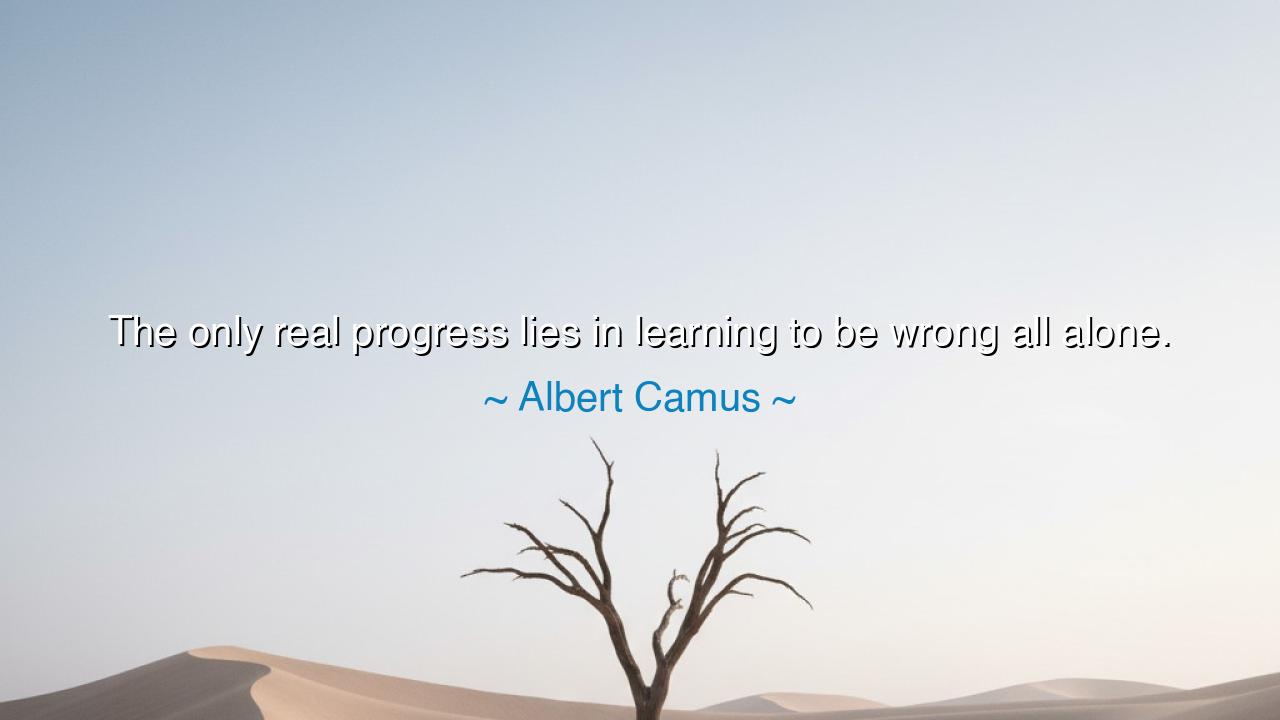
The only real progress lies in learning to be wrong all alone.






When Albert Camus wrote, “The only real progress lies in learning to be wrong all alone,” he spoke as a prophet of solitude — one who believed that truth and growth are born not in comfort or consensus, but in the courage to stand apart. His words shimmer with quiet rebellion: a call to every soul who dares to think freely, even when that freedom leads to isolation. For Camus, to “learn to be wrong all alone” was not to glorify error, but to embrace humility — the wisdom that comes from questioning everything, even oneself, without the assurance of agreement or applause.
Camus lived and wrote during a time when the world had been torn apart by ideology — fascism, communism, fanaticism. He saw how people sought safety in belonging, in believing what the crowd believed, even when that belief was false. Against this tide, he stood alone, declaring that the path to truth is not paved with certainty, but with doubt, reflection, and moral independence. To “be wrong all alone” means to have the strength to think without followers, to risk ridicule in the pursuit of understanding. In that solitude, the soul learns not just what is right or wrong, but what it truly means to be human.
In the ancient world, this kind of courage was the mark of philosophers and prophets. Socrates stood in the Athenian marketplace questioning every assumption of his time, accused of corrupting the youth because he refused to accept untested truths. He drank the poison rather than betray his conscience. He too was “wrong all alone” — not because he was mistaken, but because he was misunderstood by those who feared the freedom of thought. His lonely death became a seed for generations of thinkers who learned that solitude is often the price of integrity.
The origin of Camus’s quote lies in his lifelong struggle between rebellion and belonging. As a thinker of the absurd, he believed that life’s meaning is not handed down by gods or governments but must be created by each individual. Yet he also knew the loneliness of this path — the anguish of being right too soon or wrong without support. For Camus, progress was not measured by inventions or victories, but by inner transformation — by the ability to face uncertainty and still move forward, guided only by one’s conscience. To learn to be wrong is to shed arrogance; to do so alone is to achieve moral freedom.
We find echoes of this truth in the lives of artists, scientists, and visionaries who dared to question the accepted order. Galileo Galilei, accused of heresy for claiming the Earth moved around the sun, was condemned by the Church. He stood alone in his conviction, forced to recant under threat, yet whispered, “And yet it moves.” His solitude was not defeat — it was the price of progress. In his isolation, he proved that truth, once discovered, does not need permission to exist. Every soul who has brought light into darkness — from Rosa Parks to Frida Kahlo, from Darwin to Martin Luther — has known this lonely road of discovery.
Camus’s message is thus both humbling and heroic. It teaches that to err is not failure, but the beginning of growth; that truth cannot be found by hiding in the crowd. The individual who fears being wrong will never be free, for he lives only by borrowed beliefs. But the one who can endure the solitude of uncertainty — who can wrestle with doubt and still act with integrity — becomes a creator, a reformer, a soul unshackled by conformity. This is real progress: not the triumph of the ego, but the awakening of the conscience.
Let this be the lesson: seek not to be right in the eyes of others, but to be honest in the silence of your own heart. Do not fear being wrong, for error is the forge of wisdom. Walk alone when truth demands it, and let solitude refine you rather than break you. For in a world that rewards imitation, to think for yourself is the rarest act of courage. As Camus teaches, the journey of the soul begins not when it is applauded, but when it is alone — and still unafraid to question.
And so, remember this: progress is not the comfort of certainty, but the strength to explore uncertainty. The one who learns to be wrong all alone becomes the one who, in time, leads others toward the light — not because he was always right, but because he was never afraid to seek the truth, even in the dark.






AAdministratorAdministrator
Welcome, honored guests. Please leave a comment, we will respond soon